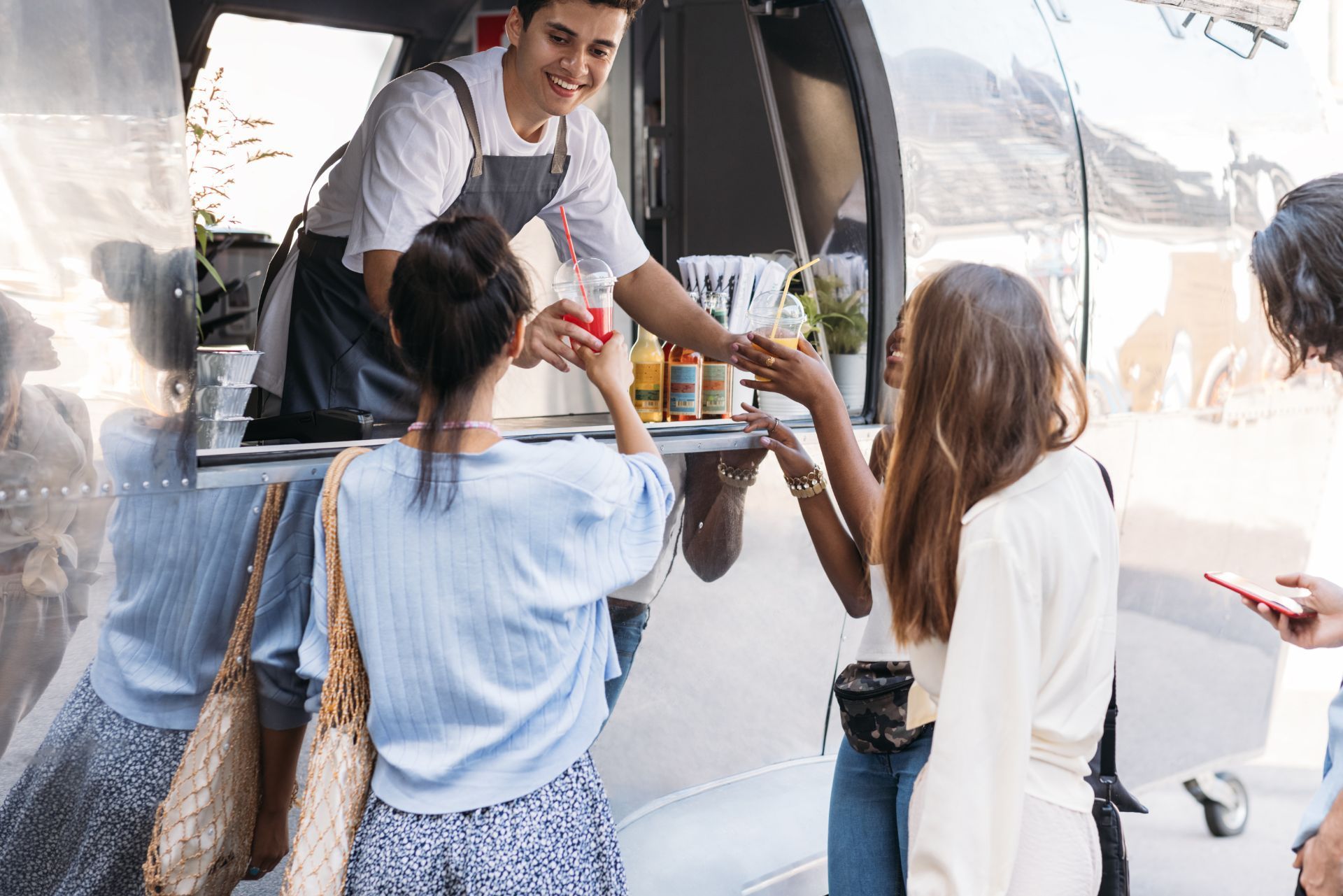Food trucks have become a vibrant part of Colorado’s culinary scene, especially in cities like Denver, which was named the second-most food-truck-friendly city in the U.S. back in 2018. This growing trend reflects a broader national surge in mobile dining, with the global food truck industry valued at around $2.7 billion as of 2023. For entrepreneurs in Colorado, understanding the insurance and coverage essentials is key to protecting their investment and staying compliant with local regulations.
Whether you’re launching a new gourmet food truck or expanding an existing fast food operation, this guide covers the critical insurance considerations every Colorado food truck owner should know. Along the way, it highlights how the state’s unique market and customer trends influence coverage needs.
Why Colorado is a Prime Market for Food Trucks
Colorado’s embrace of the food truck culture is more than a passing fad. According to Gigi Sukin of ColoradoBiz Magazine, the state has enthusiastically welcomed food trucks, especially in urban hubs like Denver and Boulder. This acceptance has helped fuel a thriving environment for mobile food businesses. The state's diverse culinary scene, influenced by its rich agricultural landscape and multicultural population, has given rise to a variety of food trucks offering everything from gourmet tacos to artisanal ice cream. This culinary diversity not only attracts locals but also draws tourists eager to sample the unique flavors that Colorado has to offer.
Denver’s recognition as a top food-truck-friendly city underscores the opportunity but also points to the need for specialized coverage. With so many trucks on the streets, competition is fierce, and the risks—from vehicle accidents to food safety claims—are real. Insurance tailored to this market is not just a formality but a business imperative. In addition to the standard liability coverage, food truck owners must consider factors such as equipment breakdown insurance, which can be crucial during peak seasons when a malfunction could mean significant losses. Furthermore, as food trucks often operate in high-traffic areas, the potential for accidents increases, making comprehensive coverage essential for peace of mind.
Moreover, food trucks in Colorado often capitalize on local events, festivals, and outdoor markets, which means coverage must adapt to varied locations and customer volumes. Understanding these dynamics helps owners choose policies that provide comprehensive protection without unnecessary costs. Seasonal events, like the Denver Food and Wine Festival or the Boulder Creek Festival, not only offer lucrative opportunities for sales but also require food trucks to navigate different regulations and permit requirements. This adaptability is key to thriving in Colorado’s vibrant food scene, and it emphasizes the importance of having a flexible insurance plan that can accommodate the ebb and flow of business throughout the year. As the food truck industry continues to grow, so too does the need for innovative solutions that address both the challenges and opportunities presented by this dynamic market.


Contact Us
Phone
Location
Core Insurance Types for Colorado Food Trucks
Running a food truck involves multiple risks, from vehicle operation to food handling. Here are the essential insurance types every Colorado food truck operator should consider:
Commercial Auto Insurance
Since the food truck is both a vehicle and a mobile business, commercial auto insurance is mandatory. This coverage protects against accidents, property damage, and bodily injury claims when the truck is on the road. Given the average purchase cost of a new food truck is around $108,500, protecting this asset is crucial.
Colorado’s diverse terrain and weather conditions can increase the risk of accidents, so opting for a policy with robust coverage limits and roadside assistance is wise. This insurance also typically covers liability if the truck causes damage to other vehicles or property. Additionally, many policies offer coverage for rental vehicles, which can be invaluable if the food truck is temporarily out of commission due to repairs or accidents, allowing business operations to continue without significant interruption.
General Liability Insurance
General liability insurance covers claims related to bodily injury or property damage that occur during business operations. For food trucks, this includes slip-and-fall accidents near the truck or damage caused by food products. Since food trucks often operate in crowded public spaces, this coverage is essential to mitigate costly lawsuits.
Colorado’s food truck operators should ensure their policies cover incidents at events and festivals, not just their regular locations. This flexibility is important given the state’s active outdoor food scene. Furthermore, having a solid general liability policy can enhance a food truck's reputation, as it demonstrates a commitment to safety and customer care, which can be a significant competitive advantage in a bustling market.
Product Liability Insurance
Food safety is a top concern for mobile food businesses. Product liability insurance protects against claims arising from foodborne illnesses or allergic reactions caused by the food served. This coverage is critical in Colorado, where food trucks often feature gourmet and specialty menus that may include allergens or unique ingredients.
Given that gourmet food trucks tend to have 35% higher profit margins than traditional fast food trucks, investing in product liability insurance helps safeguard those profits from unexpected claims. Additionally, operators should consider implementing rigorous food safety protocols and regular training for staff, as these practices not only reduce the risk of claims but also enhance customer trust and loyalty.
Equipment and Property Insurance
Food trucks carry expensive cooking equipment and inventory. Equipment insurance covers repair or replacement costs if these items are damaged or stolen. Property insurance extends protection to the truck itself when parked or not in operation.
Because food trucks operate in varied environments, from urban streets to remote festivals, this coverage should include protection against theft, vandalism, and weather-related damage. Moreover, investing in comprehensive equipment insurance can also cover losses due to equipment breakdowns, which can be particularly damaging during peak operating hours. Food truck operators should regularly assess their equipment and inventory value to ensure their coverage limits are adequate, as the cost of replacement can significantly impact the business's bottom line.
Additional Coverage Considerations for Food Truck Operators
Beyond the basics, several specialized insurance options can provide extra layers of protection tailored to Colorado’s food truck industry.
Workers’ Compensation Insurance
If the food truck employs staff, workers’ compensation insurance is required by Colorado law. This coverage provides benefits to employees injured on the job, covering medical expenses and lost wages. Even if the team is small, this insurance protects both workers and owners from costly legal claims. Moreover, it fosters a safer work environment, as operators are encouraged to implement safety protocols to minimize workplace injuries. By prioritizing employee well-being, food truck owners can also enhance morale and productivity, leading to a more efficient operation.
Business Interruption Insurance
Events like equipment breakdowns or severe weather can halt operations and cut into profits. Business interruption insurance helps cover lost income during these downtimes, ensuring the food truck can stay afloat while repairs or recovery take place. Additionally, this coverage can extend to losses incurred due to nearby construction or events that may limit access to the food truck’s location. By planning for these unexpected interruptions, operators can maintain financial stability and focus on their culinary offerings without the looming threat of sudden revenue loss.
Cyber Liability Insurance
With over 70% of food trucks using social media to promote their location and menu, many also accept digital payments and maintain customer databases. Cyber liability insurance protects against data breaches and cyberattacks, a growing concern for mobile businesses relying on technology. As food trucks increasingly integrate point-of-sale systems and online ordering platforms, the risk of sensitive customer information being compromised rises. This insurance not only covers the costs associated with data recovery and legal fees but also helps in managing public relations crises that may arise from such breaches. By investing in cyber liability insurance, food truck operators can reassure customers that their data is secure, fostering trust and loyalty in a competitive market.
Marketing and Customer Loyalty: Impact on Coverage Needs
Marketing strategies influence how food trucks operate and, consequently, their insurance needs. For example, food trucks that offer loyalty rewards programs see a 22% higher repeat customer rate. This means increased foot traffic and potential exposure to liability claims. The implementation of such programs not only fosters customer retention but also encourages patrons to share their experiences with friends and family, further amplifying the food truck's visibility and customer base. This growing popularity can lead to a surge in demand, necessitating a review of operational protocols and insurance coverage to ensure that they are adequately protected against the increased risk of accidents or injuries that may arise from larger crowds.
Social media promotion is another factor. With the majority of food trucks actively advertising on platforms like Instagram and Facebook, they often attract crowds quickly. The visual nature of these platforms allows food trucks to showcase their unique offerings and vibrant branding, which can lead to spontaneous gatherings and long lines. Insurance policies should account for the higher risk of incidents in busy, popular locations, including potential property damage or food safety issues that could arise from increased sales volume. Additionally, food trucks must be vigilant about their online reputation; negative reviews or incidents can spread rapidly, impacting customer trust and potentially leading to legal challenges. Understanding these trends helps food truck owners anticipate risks and adjust coverage accordingly. It also highlights why insurance is not static but should evolve with business growth and marketing efforts. As food trucks expand their reach, whether through pop-up events or collaborations with local businesses, they may also need to consider additional coverages, such as event insurance or product liability, to safeguard against new challenges that accompany their increased visibility and customer engagement.

Regulatory and Licensing Requirements in Colorado
Operating a food truck in Colorado involves navigating various regulations, including health permits, vehicle licensing, and insurance mandates. Compliance is vital to avoid fines and interruptions. Each municipality may have its own set of rules, so it’s essential for food truck operators to familiarize themselves with local regulations. This can include everything from the hours of operation to the types of food that can be served, which can vary significantly from one city to another.
Colorado requires food trucks to carry minimum liability insurance for vehicles and general business operations. Additionally, health department inspections ensure food safety standards are met, which ties back to the importance of product liability insurance. Food trucks must also obtain a food service license, which may involve a series of inspections to ensure that food handling practices meet state and local health codes. This not only protects consumers but also enhances the credibility of the food truck business, as customers are more likely to patronize establishments that prioritize safety and hygiene.
Staying up to date with local city ordinances is also critical. For example, Denver’s food truck-friendly status comes with specific rules about where trucks can park and operate. Insurance policies should reflect these operational realities to avoid coverage gaps. Furthermore, food truck operators must be aware of any special permits required for events, festivals, or private catering jobs, which often necessitate additional documentation and fees. Engaging with local food truck associations can provide valuable resources and networking opportunities, helping operators stay informed about any changes in legislation or best practices within the industry.
In addition to these requirements, food truck owners should consider the importance of maintaining accurate records of all permits and licenses. This not only aids in compliance during inspections but also serves as a reference for future business planning. Keeping detailed logs of food inventory, employee training, and customer feedback can also provide insights into operational efficiency and areas for improvement. As the food truck industry continues to grow in popularity, understanding and adhering to regulatory and licensing requirements will be essential for long-term success and sustainability.
Choosing the Right Insurance Provider
Finding an insurance provider experienced in food truck coverage can make a significant difference. Providers familiar with Colorado’s market understand the nuances of local regulations and risks.
When evaluating options, food truck owners should look for policies that offer:
- Comprehensive coverage tailored to mobile food businesses
- Flexible terms to accommodate seasonal and event-based operations
- Competitive premiums that reflect the truck’s specialty and profit margins
- Responsive claims support with quick turnaround times
Given the investment involved and the complexity of risks, working with an insurer who can provide expert guidance is invaluable.
What to Remember When Insuring Your Colorado Food Truck
Insurance for food trucks is more than a checkbox; it’s a strategic tool that protects your business and supports growth. Colorado’s food truck market offers exciting opportunities but also unique challenges that require thoughtful coverage.
From commercial auto insurance to product liability and workers’ compensation, each policy element plays a role in minimizing risk. Staying informed about industry trends, like the increased profitability of gourmet trucks or the benefits of loyalty programs, helps tailor insurance to your business model.
For a deeper dive into the food truck industry’s current landscape, the
State of the Industry: Food Trucks in the U.S. (7th Edition) report offers comprehensive data on sales, demographics, and trends that can inform your coverage decisions.
Frequently Asked Questions
Q: Is commercial auto insurance required for food trucks in Colorado?
A: Yes. Since food trucks operate as vehicles, commercial auto insurance is mandatory to cover accidents and liability on the road.
Q: What does product liability insurance cover for food trucks?
It protects against claims related to foodborne illnesses or allergic reactions caused by the food served.
Q: Are food trucks in Colorado required to have workers’ compensation insurance?
Yes. If the food truck employs staff, workers’ compensation insurance is required by state law to cover workplace injuries.
Q: How does offering a loyalty rewards program affect insurance needs?
Programs that increase repeat customers can lead to higher foot traffic, which may increase liability exposure and require reviewing coverage limits.
Q: Can food trucks get coverage for business interruptions?
Yes. Business interruption insurance helps cover lost income during events like equipment failure or severe weather.
Q: How important is social media for food truck marketing?
Very important. Over 70% of food trucks use social media to promote their locations and menus, which can increase customer volume and risk exposure.
ABOUT THE AUTHOR:
JEFF MAGOON
I'm Jeff Magoon, Principal at Magoon Group Insurance Intelligence, helping Colorado businesses simplify risk, close coverage gaps, and get fast, strategic support for their insurance and growth needs.
Contact Us
Real Reviews from People We’ve Helped
Clients trust us because we make insurance simple, responsive, and effective. From complex business coverage to personal policies, Magoon Group delivers results with clarity and care.
Specialized Insurance
We understand the unique risks of different industries. Whether you’re managing people, property, or services, we deliver coverage that keeps you protected and compliant.
From general to specialty contractors, we provide coverage for job sites, tools, vehicles, and liability.
Protection for your inventory, property, and operations—whether you're selling, repairing, or leasing.
Coverage for malpractice, equipment, employees, and your professional reputation.

What You Should Know About Insurance
We get a lot of questions—and we’re happy to answer them. Here are a few we hear most often, with answers you can count on.
Helpful Insurance Tips & News
We post new articles that help you stay informed, avoid costly mistakes, and understand your coverage better.
Contact Us
Phone
Location







